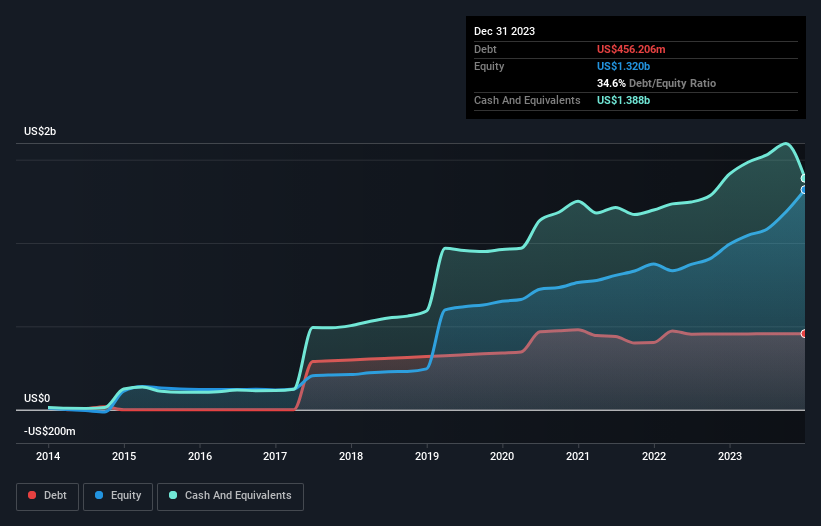
Howard Marks put it nicely when he said that, rather than worrying about share price volatility, 'The possibility of permanent loss is the risk I worry about... and every practical investor I know worries about.' So it seems the smart money knows that debt - which is usually involved in bankruptcies - is a very important factor, when you assess how risky a company is. We can see that HubSpot, Inc. (NYSE:HUBS) does use debt in its business. But the more important question is: how much risk is that debt creating?
Why Does Debt Bring Risk?
Generally speaking, debt only becomes a real problem when a company can't easily pay it off, either by raising capital or with its own cash flow. In the worst case scenario, a company can go bankrupt if it cannot pay its creditors. However, a more usual (but still expensive) situation is where a company must dilute shareholders at a cheap share price simply to get debt under control. Of course, plenty of companies use debt to fund growth, without any negative consequences. When we examine debt levels, we first consider both cash and debt levels, together.
See our latest analysis for HubSpot
How Much Debt Does HubSpot Carry?
As you can see below, HubSpot had US$456.2m of debt, at December 2023, which is about the same as the year before. You can click the chart for greater detail. However, its balance sheet shows it holds US$1.39b in cash, so it actually has US$932.0m net cash.

How Healthy Is HubSpot's Balance Sheet?
The latest balance sheet data shows that HubSpot had liabilities of US$956.2m due within a year, and liabilities of US$795.0m falling due after that. On the other hand, it had cash of US$1.39b and US$295.3m worth of receivables due within a year. So its liabilities outweigh the sum of its cash and (near-term) receivables by US$67.7m.
This state of affairs indicates that HubSpot's balance sheet looks quite solid, as its total liabilities are just about equal to its liquid assets. So while it's hard to imagine that the US$30.4b company is struggling for cash, we still think it's worth monitoring its balance sheet. Despite its noteworthy liabilities, HubSpot boasts net cash, so it's fair to say it does not have a heavy debt load! When analysing debt levels, the balance sheet is the obvious place to start. But it is future earnings, more than anything, that will determine HubSpot's ability to maintain a healthy balance sheet going forward. So if you want to see what the professionals think, you might find this free report on analyst profit forecasts to be interesting.
In the last year HubSpot wasn't profitable at an EBIT level, but managed to grow its revenue by 25%, to US$2.2b. With any luck the company will be able to grow its way to profitability.
So How Risky Is HubSpot?
While HubSpot lost money on an earnings before interest and tax (EBIT) level, it actually generated positive free cash flow US$251m. So taking that on face value, and considering the net cash situation, we don't think that the stock is too risky in the near term. The good news for HubSpot shareholders is that its revenue growth is strong, making it easier to raise capital if need be. But we still think it's somewhat risky. When analysing debt levels, the balance sheet is the obvious place to start. But ultimately, every company can contain risks that exist outside of the balance sheet. To that end, you should be aware of the 1 warning sign we've spotted with HubSpot .
When all is said and done, sometimes its easier to focus on companies that don't even need debt. Readers can access a list of growth stocks with zero net debt 100% free, right now.
Valuation is complex, but we're here to simplify it.
Discover if HubSpot might be undervalued or overvalued with our detailed analysis, featuring fair value estimates, potential risks, dividends, insider trades, and its financial condition.
Access Free AnalysisHave feedback on this article? Concerned about the content? Get in touch with us directly. Alternatively, email editorial-team (at) simplywallst.com.
This article by Simply Wall St is general in nature. We provide commentary based on historical data and analyst forecasts only using an unbiased methodology and our articles are not intended to be financial advice. It does not constitute a recommendation to buy or sell any stock, and does not take account of your objectives, or your financial situation. We aim to bring you long-term focused analysis driven by fundamental data. Note that our analysis may not factor in the latest price-sensitive company announcements or qualitative material. Simply Wall St has no position in any stocks mentioned.
About NYSE:HUBS
HubSpot
Provides a cloud-based customer relationship management (CRM) platform for businesses in the Americas, Europe, and the Asia Pacific.
Flawless balance sheet with high growth potential.
Similar Companies
Market Insights
Community Narratives



